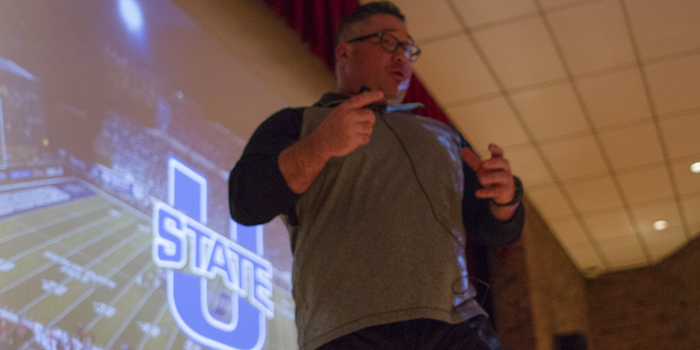
In the first segment of his elitefts 2017 Sports Performance Summit presentation, Head Strength and Conditioning Coach of the San Francisco 49ers Mark Uyeyama shared his history in the industry and the most valuable lessons he learned in each phase of his journey to the NFL. Now in part two, Uyeyama moves to focus on progress in the field and his thoughts on future development.
He begins by sharing his stance on emerging technology and why he has taken a conservative stance on the latest, most cutting-edge tools. Instead, his focus is on the foundational principles that can build any team. First, provide ownership. The athlete must have accountability. There are leaders and there are good coaches, but in the end, ownership must fall on the individuals. If you can make your athletes feel personally accountable for their success, they'll do the things they need to do to improve. Secondly, how do you deal with athlete's motivation? The answer for Uyeyama is that the type of motivation doesn't matter. The athlete's source of motivation? Their reasons for playing the sport? They don't matter. All that matters is what they do consistently — the reasons are secondary. Which leads to the third concept: communication and creating dialogue with the players. Uyeyama goes through the importance of communicating with players and the value that it can create within a program.
WATCH: Mark Uyeyama SPS Presentation — Where I've Been
Uyeyama then discusses a high-performance model and the factors that feed into an athlete's success. The model, developed roughly 30 years ago, was on the right track. It took into consideration the things that Uyeyama believes really matter for athletes. But somehow, along the way, the profession got sidetracked to things that don't matter so much. Giving specific details, he works through the way that strength and conditioning programs often overlook the most important parts of sports preparation. The focus should always be on the fundamentals — they matter more than anything else.
However, Uyeyama isn't interested in complaining about the industry; he's interested in improving it. He moves forward in his presentation to discuss ways to unify knowledge in the industry and change the way that he and other coaches look at the profession of strength and conditioning. This means stepping outside of your silo and utilizing the knowledge of others. It means understanding how to work with not only your own expertise but also with the expertise of others. It also means understanding the individualization of athletes. To demonstrate this final point, Uyeyama shares a story of Julio Jones and a week of no practice before the most important game of the year.
By the minute:
- (0:30) Linear vs. exponential progress
- (3:00) Fundamental vs. emerging principles
- (6:20) Motivation
- (9:45) Three-part morning assessment
- (13:45) Up-tempo offense and training impact
- (18:00) Having an impact on the industry
- (22:50) Stepping outside your silo
- (26:50) Sushi preparation and strength
- (30:00) Specialization of training










2 Comments